Business Ethics and Responsible Management Report - London Hospitality
VerifiedAdded on 2023/06/07
|12
|3618
|101
Report
AI Summary
This report provides a comprehensive analysis of business ethics, focusing on a case study within the hospitality industry in London, UK. The report is divided into two main parts: Part 1(A) examines ethical issues, their importance, and the impact on stakeholders, including employees, shareholders, customers, government, and suppliers, alongside examples of good and bad ethical practices. Part 1(B) delves into ethical theories, specifically utilitarianism and deontology, discussing their advantages and disadvantages and their application to the case study. The report concludes with Part 2, which presents a reflective essay on ethical leadership. The report provides recommendations for improving ethical practices within the hospitality industry, addressing issues such as transparency in pricing and ensuring customer satisfaction, and offers a framework for ethical decision-making and responsible management.
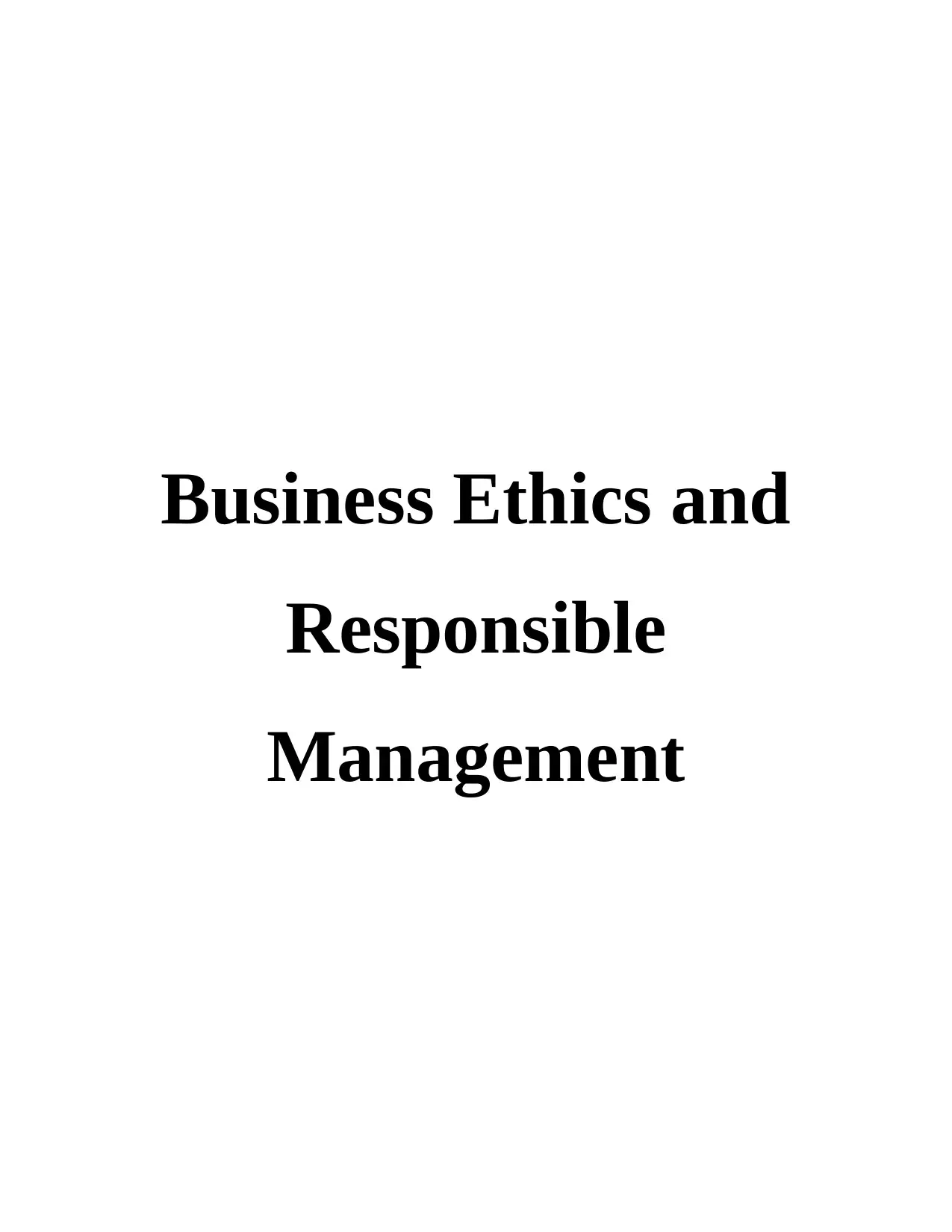
Business Ethics and
Responsible
Management
Responsible
Management
Paraphrase This Document
Need a fresh take? Get an instant paraphrase of this document with our AI Paraphraser
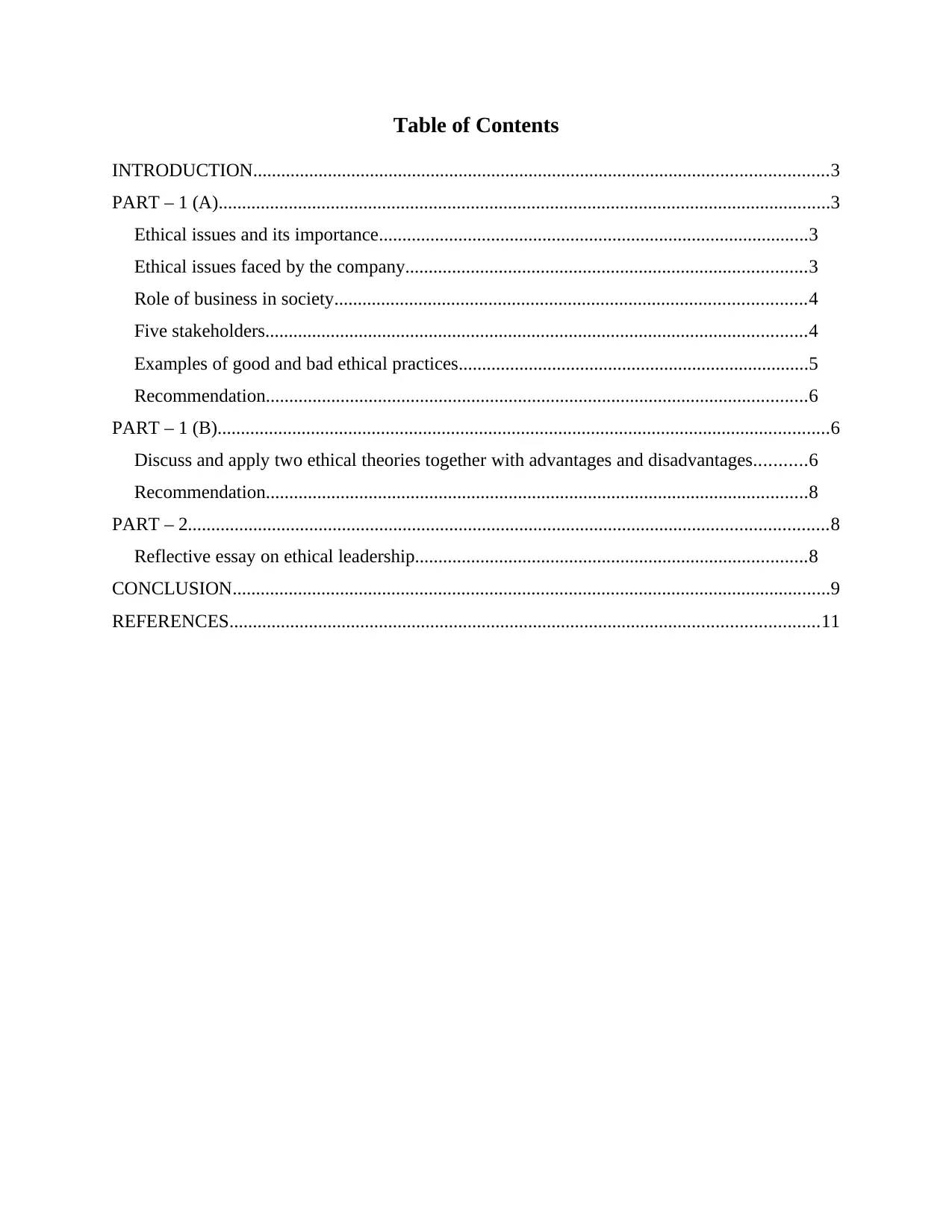
Table of Contents
INTRODUCTION...........................................................................................................................3
PART – 1 (A)...................................................................................................................................3
Ethical issues and its importance............................................................................................3
Ethical issues faced by the company......................................................................................3
Role of business in society.....................................................................................................4
Five stakeholders....................................................................................................................4
Examples of good and bad ethical practices...........................................................................5
Recommendation....................................................................................................................6
PART – 1 (B)...................................................................................................................................6
Discuss and apply two ethical theories together with advantages and disadvantages...........6
Recommendation....................................................................................................................8
PART – 2.........................................................................................................................................8
Reflective essay on ethical leadership....................................................................................8
CONCLUSION................................................................................................................................9
REFERENCES..............................................................................................................................11
INTRODUCTION...........................................................................................................................3
PART – 1 (A)...................................................................................................................................3
Ethical issues and its importance............................................................................................3
Ethical issues faced by the company......................................................................................3
Role of business in society.....................................................................................................4
Five stakeholders....................................................................................................................4
Examples of good and bad ethical practices...........................................................................5
Recommendation....................................................................................................................6
PART – 1 (B)...................................................................................................................................6
Discuss and apply two ethical theories together with advantages and disadvantages...........6
Recommendation....................................................................................................................8
PART – 2.........................................................................................................................................8
Reflective essay on ethical leadership....................................................................................8
CONCLUSION................................................................................................................................9
REFERENCES..............................................................................................................................11

⊘ This is a preview!⊘
Do you want full access?
Subscribe today to unlock all pages.

Trusted by 1+ million students worldwide
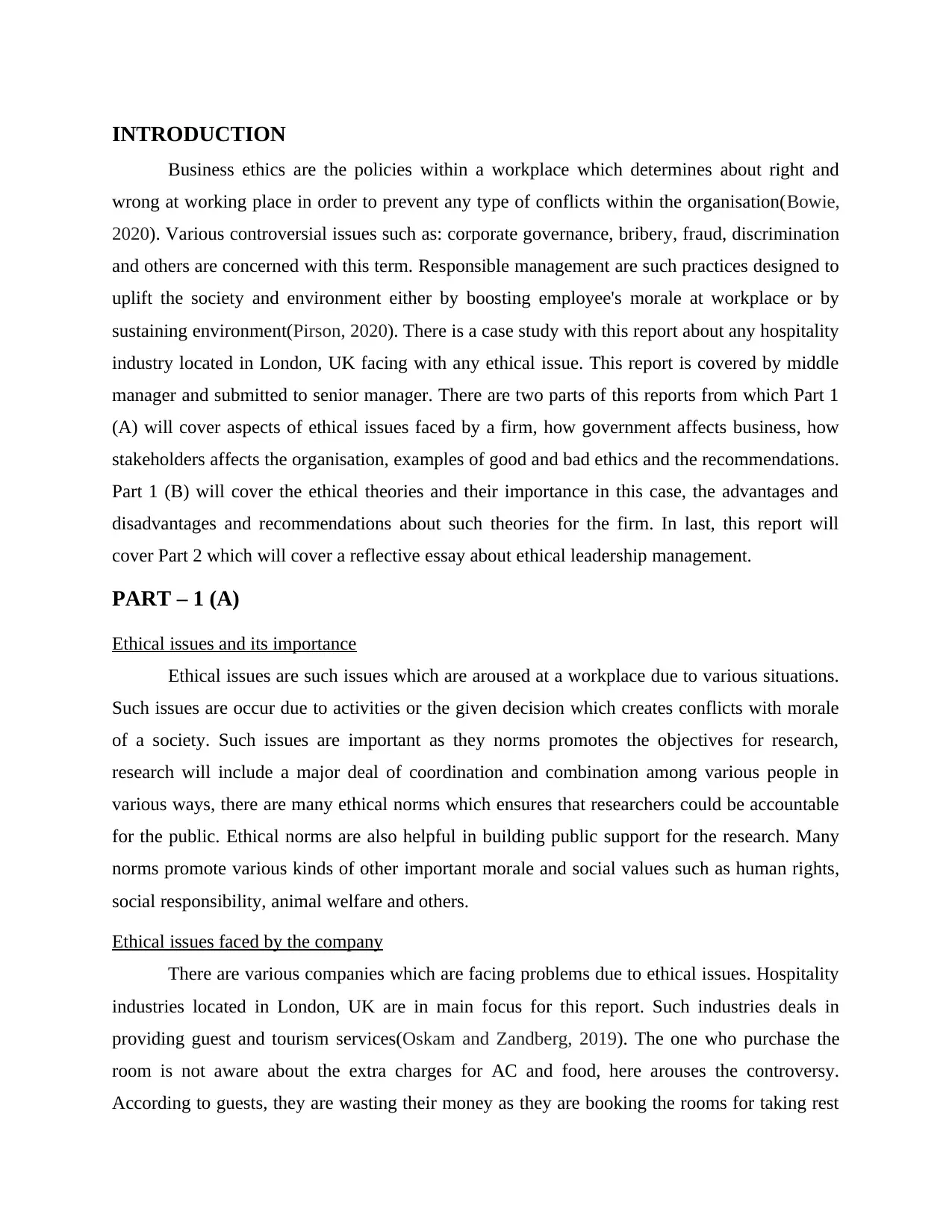
INTRODUCTION
Business ethics are the policies within a workplace which determines about right and
wrong at working place in order to prevent any type of conflicts within the organisation(Bowie,
2020). Various controversial issues such as: corporate governance, bribery, fraud, discrimination
and others are concerned with this term. Responsible management are such practices designed to
uplift the society and environment either by boosting employee's morale at workplace or by
sustaining environment(Pirson, 2020). There is a case study with this report about any hospitality
industry located in London, UK facing with any ethical issue. This report is covered by middle
manager and submitted to senior manager. There are two parts of this reports from which Part 1
(A) will cover aspects of ethical issues faced by a firm, how government affects business, how
stakeholders affects the organisation, examples of good and bad ethics and the recommendations.
Part 1 (B) will cover the ethical theories and their importance in this case, the advantages and
disadvantages and recommendations about such theories for the firm. In last, this report will
cover Part 2 which will cover a reflective essay about ethical leadership management.
PART – 1 (A)
Ethical issues and its importance
Ethical issues are such issues which are aroused at a workplace due to various situations.
Such issues are occur due to activities or the given decision which creates conflicts with morale
of a society. Such issues are important as they norms promotes the objectives for research,
research will include a major deal of coordination and combination among various people in
various ways, there are many ethical norms which ensures that researchers could be accountable
for the public. Ethical norms are also helpful in building public support for the research. Many
norms promote various kinds of other important morale and social values such as human rights,
social responsibility, animal welfare and others.
Ethical issues faced by the company
There are various companies which are facing problems due to ethical issues. Hospitality
industries located in London, UK are in main focus for this report. Such industries deals in
providing guest and tourism services(Oskam and Zandberg, 2019). The one who purchase the
room is not aware about the extra charges for AC and food, here arouses the controversy.
According to guests, they are wasting their money as they are booking the rooms for taking rest
Business ethics are the policies within a workplace which determines about right and
wrong at working place in order to prevent any type of conflicts within the organisation(Bowie,
2020). Various controversial issues such as: corporate governance, bribery, fraud, discrimination
and others are concerned with this term. Responsible management are such practices designed to
uplift the society and environment either by boosting employee's morale at workplace or by
sustaining environment(Pirson, 2020). There is a case study with this report about any hospitality
industry located in London, UK facing with any ethical issue. This report is covered by middle
manager and submitted to senior manager. There are two parts of this reports from which Part 1
(A) will cover aspects of ethical issues faced by a firm, how government affects business, how
stakeholders affects the organisation, examples of good and bad ethics and the recommendations.
Part 1 (B) will cover the ethical theories and their importance in this case, the advantages and
disadvantages and recommendations about such theories for the firm. In last, this report will
cover Part 2 which will cover a reflective essay about ethical leadership management.
PART – 1 (A)
Ethical issues and its importance
Ethical issues are such issues which are aroused at a workplace due to various situations.
Such issues are occur due to activities or the given decision which creates conflicts with morale
of a society. Such issues are important as they norms promotes the objectives for research,
research will include a major deal of coordination and combination among various people in
various ways, there are many ethical norms which ensures that researchers could be accountable
for the public. Ethical norms are also helpful in building public support for the research. Many
norms promote various kinds of other important morale and social values such as human rights,
social responsibility, animal welfare and others.
Ethical issues faced by the company
There are various companies which are facing problems due to ethical issues. Hospitality
industries located in London, UK are in main focus for this report. Such industries deals in
providing guest and tourism services(Oskam and Zandberg, 2019). The one who purchase the
room is not aware about the extra charges for AC and food, here arouses the controversy.
According to guests, they are wasting their money as they are booking the rooms for taking rest
Paraphrase This Document
Need a fresh take? Get an instant paraphrase of this document with our AI Paraphraser
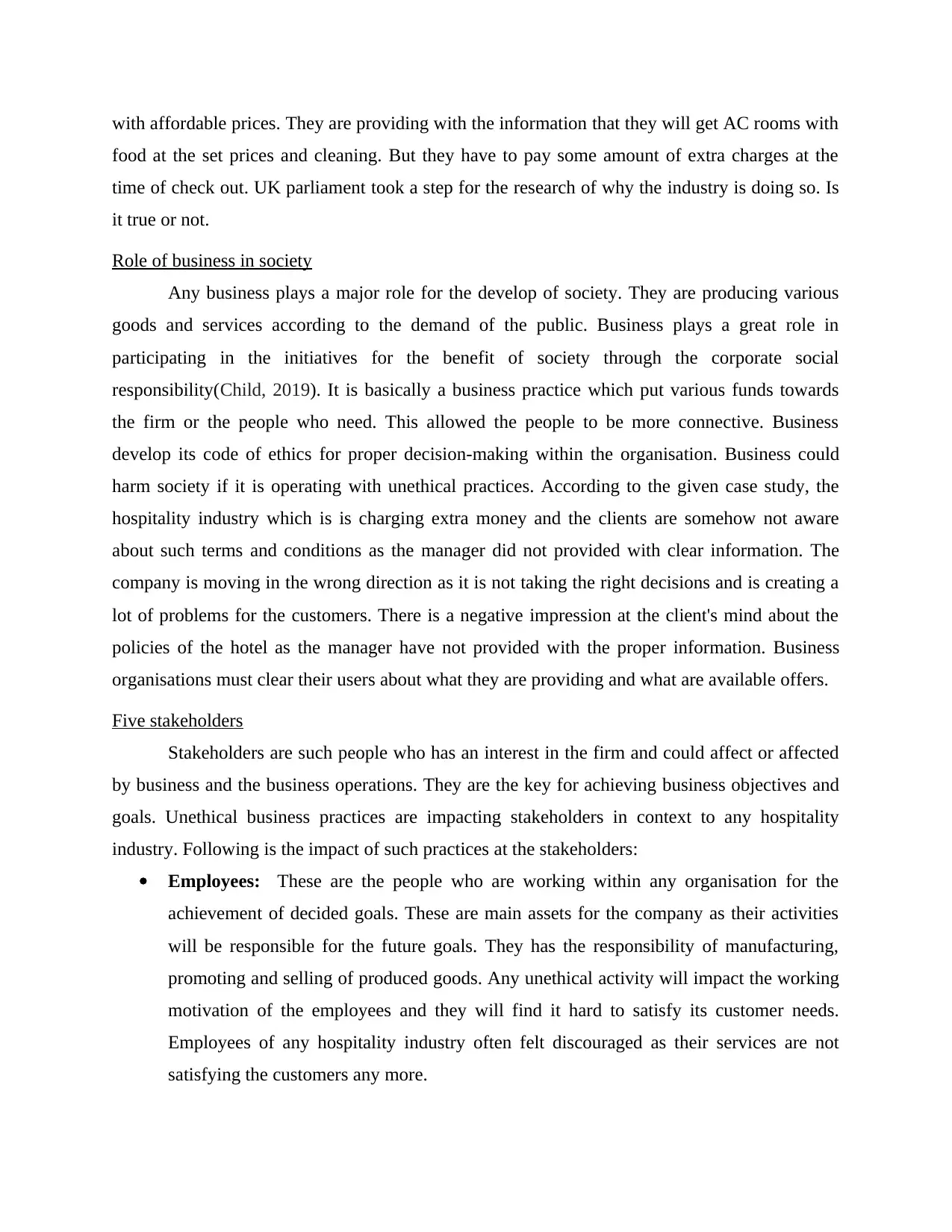
with affordable prices. They are providing with the information that they will get AC rooms with
food at the set prices and cleaning. But they have to pay some amount of extra charges at the
time of check out. UK parliament took a step for the research of why the industry is doing so. Is
it true or not.
Role of business in society
Any business plays a major role for the develop of society. They are producing various
goods and services according to the demand of the public. Business plays a great role in
participating in the initiatives for the benefit of society through the corporate social
responsibility(Child, 2019). It is basically a business practice which put various funds towards
the firm or the people who need. This allowed the people to be more connective. Business
develop its code of ethics for proper decision-making within the organisation. Business could
harm society if it is operating with unethical practices. According to the given case study, the
hospitality industry which is is charging extra money and the clients are somehow not aware
about such terms and conditions as the manager did not provided with clear information. The
company is moving in the wrong direction as it is not taking the right decisions and is creating a
lot of problems for the customers. There is a negative impression at the client's mind about the
policies of the hotel as the manager have not provided with the proper information. Business
organisations must clear their users about what they are providing and what are available offers.
Five stakeholders
Stakeholders are such people who has an interest in the firm and could affect or affected
by business and the business operations. They are the key for achieving business objectives and
goals. Unethical business practices are impacting stakeholders in context to any hospitality
industry. Following is the impact of such practices at the stakeholders:
Employees: These are the people who are working within any organisation for the
achievement of decided goals. These are main assets for the company as their activities
will be responsible for the future goals. They has the responsibility of manufacturing,
promoting and selling of produced goods. Any unethical activity will impact the working
motivation of the employees and they will find it hard to satisfy its customer needs.
Employees of any hospitality industry often felt discouraged as their services are not
satisfying the customers any more.
food at the set prices and cleaning. But they have to pay some amount of extra charges at the
time of check out. UK parliament took a step for the research of why the industry is doing so. Is
it true or not.
Role of business in society
Any business plays a major role for the develop of society. They are producing various
goods and services according to the demand of the public. Business plays a great role in
participating in the initiatives for the benefit of society through the corporate social
responsibility(Child, 2019). It is basically a business practice which put various funds towards
the firm or the people who need. This allowed the people to be more connective. Business
develop its code of ethics for proper decision-making within the organisation. Business could
harm society if it is operating with unethical practices. According to the given case study, the
hospitality industry which is is charging extra money and the clients are somehow not aware
about such terms and conditions as the manager did not provided with clear information. The
company is moving in the wrong direction as it is not taking the right decisions and is creating a
lot of problems for the customers. There is a negative impression at the client's mind about the
policies of the hotel as the manager have not provided with the proper information. Business
organisations must clear their users about what they are providing and what are available offers.
Five stakeholders
Stakeholders are such people who has an interest in the firm and could affect or affected
by business and the business operations. They are the key for achieving business objectives and
goals. Unethical business practices are impacting stakeholders in context to any hospitality
industry. Following is the impact of such practices at the stakeholders:
Employees: These are the people who are working within any organisation for the
achievement of decided goals. These are main assets for the company as their activities
will be responsible for the future goals. They has the responsibility of manufacturing,
promoting and selling of produced goods. Any unethical activity will impact the working
motivation of the employees and they will find it hard to satisfy its customer needs.
Employees of any hospitality industry often felt discouraged as their services are not
satisfying the customers any more.
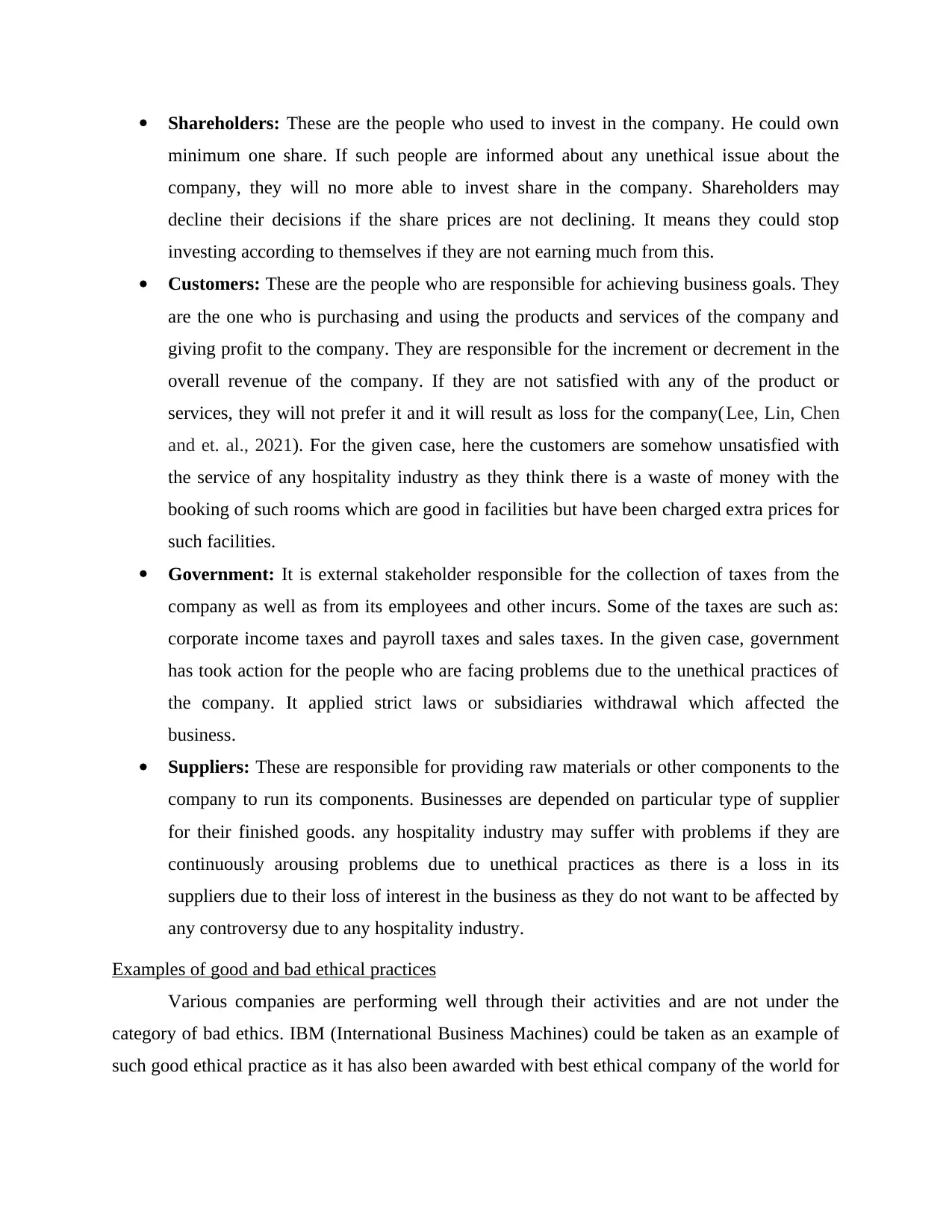
Shareholders: These are the people who used to invest in the company. He could own
minimum one share. If such people are informed about any unethical issue about the
company, they will no more able to invest share in the company. Shareholders may
decline their decisions if the share prices are not declining. It means they could stop
investing according to themselves if they are not earning much from this.
Customers: These are the people who are responsible for achieving business goals. They
are the one who is purchasing and using the products and services of the company and
giving profit to the company. They are responsible for the increment or decrement in the
overall revenue of the company. If they are not satisfied with any of the product or
services, they will not prefer it and it will result as loss for the company(Lee, Lin, Chen
and et. al., 2021). For the given case, here the customers are somehow unsatisfied with
the service of any hospitality industry as they think there is a waste of money with the
booking of such rooms which are good in facilities but have been charged extra prices for
such facilities.
Government: It is external stakeholder responsible for the collection of taxes from the
company as well as from its employees and other incurs. Some of the taxes are such as:
corporate income taxes and payroll taxes and sales taxes. In the given case, government
has took action for the people who are facing problems due to the unethical practices of
the company. It applied strict laws or subsidiaries withdrawal which affected the
business.
Suppliers: These are responsible for providing raw materials or other components to the
company to run its components. Businesses are depended on particular type of supplier
for their finished goods. any hospitality industry may suffer with problems if they are
continuously arousing problems due to unethical practices as there is a loss in its
suppliers due to their loss of interest in the business as they do not want to be affected by
any controversy due to any hospitality industry.
Examples of good and bad ethical practices
Various companies are performing well through their activities and are not under the
category of bad ethics. IBM (International Business Machines) could be taken as an example of
such good ethical practice as it has also been awarded with best ethical company of the world for
minimum one share. If such people are informed about any unethical issue about the
company, they will no more able to invest share in the company. Shareholders may
decline their decisions if the share prices are not declining. It means they could stop
investing according to themselves if they are not earning much from this.
Customers: These are the people who are responsible for achieving business goals. They
are the one who is purchasing and using the products and services of the company and
giving profit to the company. They are responsible for the increment or decrement in the
overall revenue of the company. If they are not satisfied with any of the product or
services, they will not prefer it and it will result as loss for the company(Lee, Lin, Chen
and et. al., 2021). For the given case, here the customers are somehow unsatisfied with
the service of any hospitality industry as they think there is a waste of money with the
booking of such rooms which are good in facilities but have been charged extra prices for
such facilities.
Government: It is external stakeholder responsible for the collection of taxes from the
company as well as from its employees and other incurs. Some of the taxes are such as:
corporate income taxes and payroll taxes and sales taxes. In the given case, government
has took action for the people who are facing problems due to the unethical practices of
the company. It applied strict laws or subsidiaries withdrawal which affected the
business.
Suppliers: These are responsible for providing raw materials or other components to the
company to run its components. Businesses are depended on particular type of supplier
for their finished goods. any hospitality industry may suffer with problems if they are
continuously arousing problems due to unethical practices as there is a loss in its
suppliers due to their loss of interest in the business as they do not want to be affected by
any controversy due to any hospitality industry.
Examples of good and bad ethical practices
Various companies are performing well through their activities and are not under the
category of bad ethics. IBM (International Business Machines) could be taken as an example of
such good ethical practice as it has also been awarded with best ethical company of the world for
⊘ This is a preview!⊘
Do you want full access?
Subscribe today to unlock all pages.

Trusted by 1+ million students worldwide
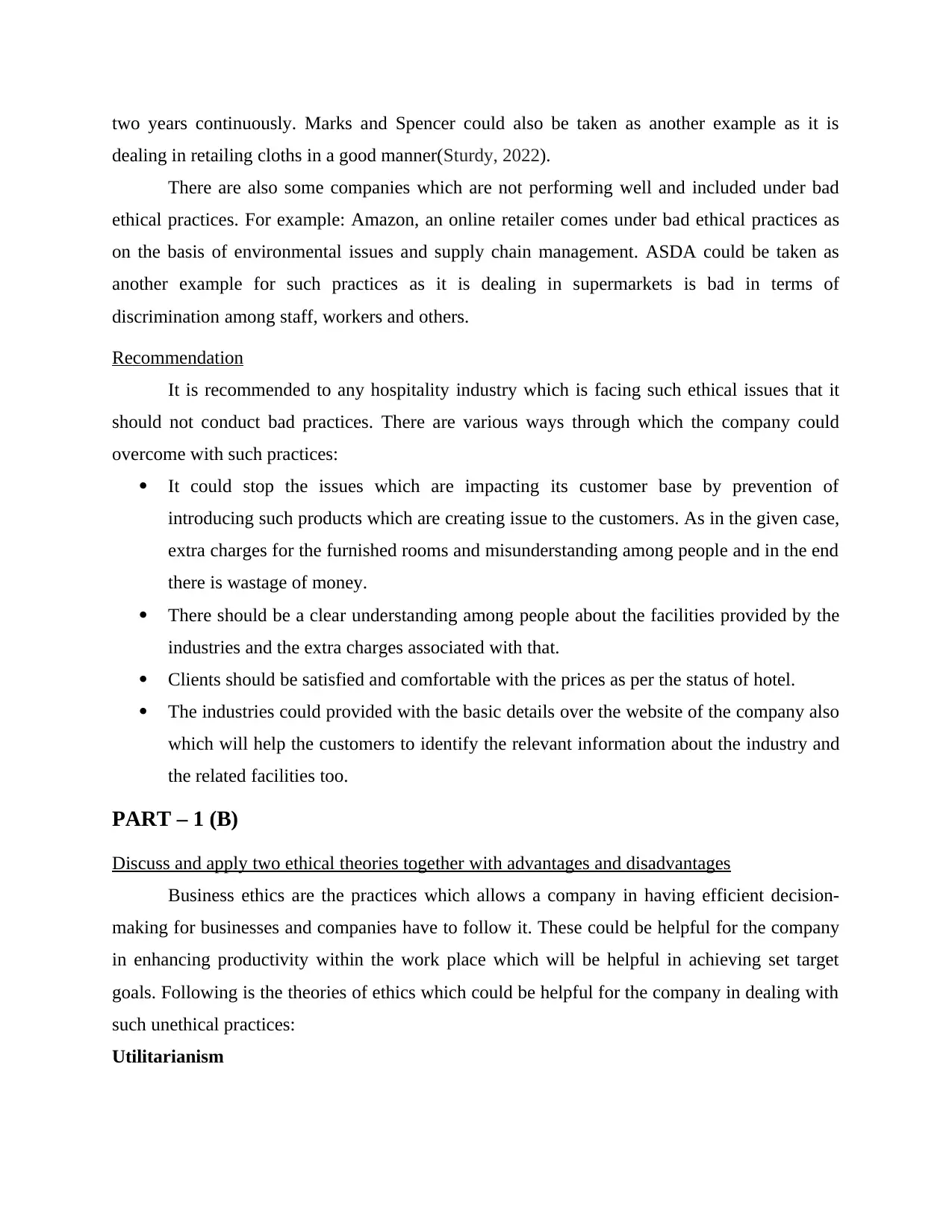
two years continuously. Marks and Spencer could also be taken as another example as it is
dealing in retailing cloths in a good manner(Sturdy, 2022).
There are also some companies which are not performing well and included under bad
ethical practices. For example: Amazon, an online retailer comes under bad ethical practices as
on the basis of environmental issues and supply chain management. ASDA could be taken as
another example for such practices as it is dealing in supermarkets is bad in terms of
discrimination among staff, workers and others.
Recommendation
It is recommended to any hospitality industry which is facing such ethical issues that it
should not conduct bad practices. There are various ways through which the company could
overcome with such practices:
It could stop the issues which are impacting its customer base by prevention of
introducing such products which are creating issue to the customers. As in the given case,
extra charges for the furnished rooms and misunderstanding among people and in the end
there is wastage of money.
There should be a clear understanding among people about the facilities provided by the
industries and the extra charges associated with that.
Clients should be satisfied and comfortable with the prices as per the status of hotel.
The industries could provided with the basic details over the website of the company also
which will help the customers to identify the relevant information about the industry and
the related facilities too.
PART – 1 (B)
Discuss and apply two ethical theories together with advantages and disadvantages
Business ethics are the practices which allows a company in having efficient decision-
making for businesses and companies have to follow it. These could be helpful for the company
in enhancing productivity within the work place which will be helpful in achieving set target
goals. Following is the theories of ethics which could be helpful for the company in dealing with
such unethical practices:
Utilitarianism
dealing in retailing cloths in a good manner(Sturdy, 2022).
There are also some companies which are not performing well and included under bad
ethical practices. For example: Amazon, an online retailer comes under bad ethical practices as
on the basis of environmental issues and supply chain management. ASDA could be taken as
another example for such practices as it is dealing in supermarkets is bad in terms of
discrimination among staff, workers and others.
Recommendation
It is recommended to any hospitality industry which is facing such ethical issues that it
should not conduct bad practices. There are various ways through which the company could
overcome with such practices:
It could stop the issues which are impacting its customer base by prevention of
introducing such products which are creating issue to the customers. As in the given case,
extra charges for the furnished rooms and misunderstanding among people and in the end
there is wastage of money.
There should be a clear understanding among people about the facilities provided by the
industries and the extra charges associated with that.
Clients should be satisfied and comfortable with the prices as per the status of hotel.
The industries could provided with the basic details over the website of the company also
which will help the customers to identify the relevant information about the industry and
the related facilities too.
PART – 1 (B)
Discuss and apply two ethical theories together with advantages and disadvantages
Business ethics are the practices which allows a company in having efficient decision-
making for businesses and companies have to follow it. These could be helpful for the company
in enhancing productivity within the work place which will be helpful in achieving set target
goals. Following is the theories of ethics which could be helpful for the company in dealing with
such unethical practices:
Utilitarianism
Paraphrase This Document
Need a fresh take? Get an instant paraphrase of this document with our AI Paraphraser
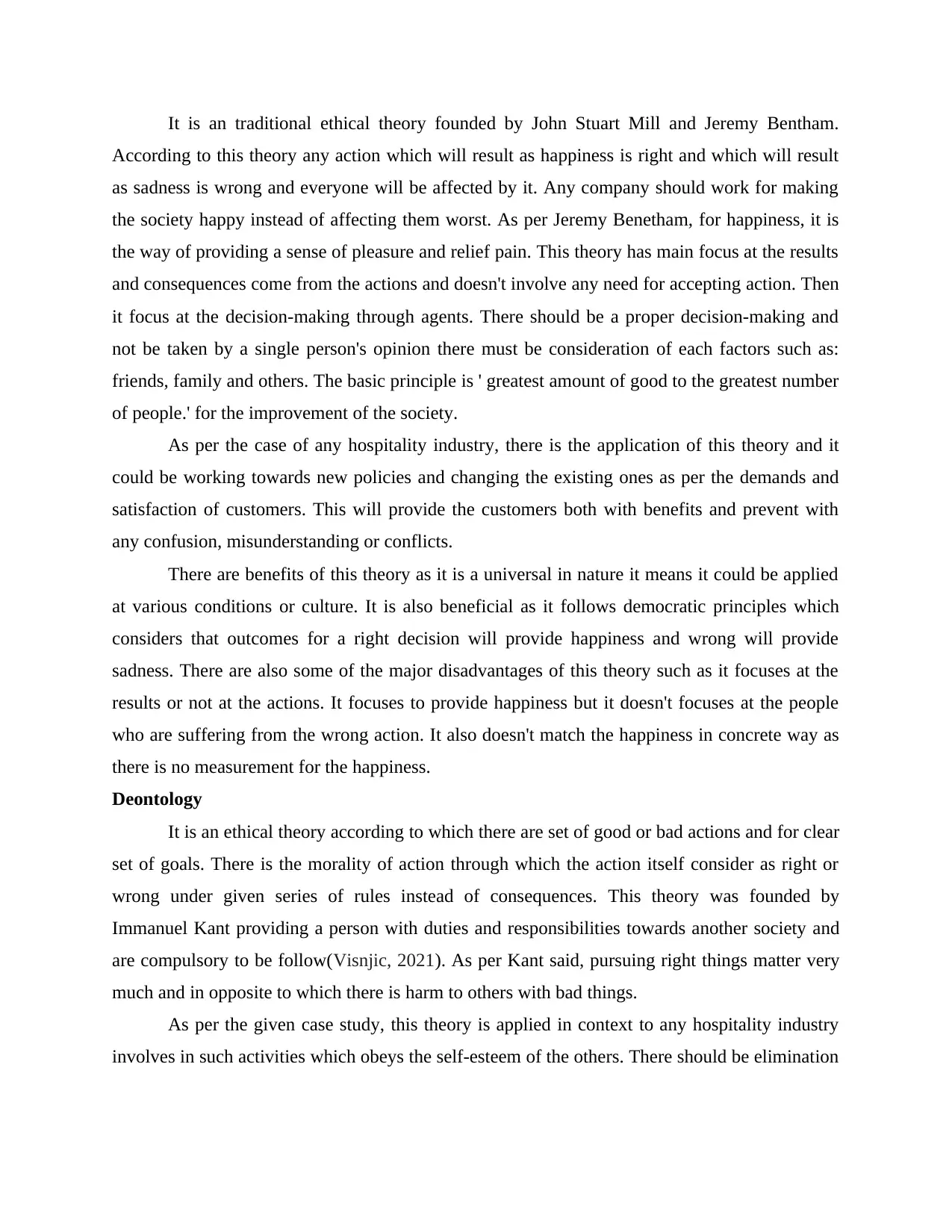
It is an traditional ethical theory founded by John Stuart Mill and Jeremy Bentham.
According to this theory any action which will result as happiness is right and which will result
as sadness is wrong and everyone will be affected by it. Any company should work for making
the society happy instead of affecting them worst. As per Jeremy Benetham, for happiness, it is
the way of providing a sense of pleasure and relief pain. This theory has main focus at the results
and consequences come from the actions and doesn't involve any need for accepting action. Then
it focus at the decision-making through agents. There should be a proper decision-making and
not be taken by a single person's opinion there must be consideration of each factors such as:
friends, family and others. The basic principle is ' greatest amount of good to the greatest number
of people.' for the improvement of the society.
As per the case of any hospitality industry, there is the application of this theory and it
could be working towards new policies and changing the existing ones as per the demands and
satisfaction of customers. This will provide the customers both with benefits and prevent with
any confusion, misunderstanding or conflicts.
There are benefits of this theory as it is a universal in nature it means it could be applied
at various conditions or culture. It is also beneficial as it follows democratic principles which
considers that outcomes for a right decision will provide happiness and wrong will provide
sadness. There are also some of the major disadvantages of this theory such as it focuses at the
results or not at the actions. It focuses to provide happiness but it doesn't focuses at the people
who are suffering from the wrong action. It also doesn't match the happiness in concrete way as
there is no measurement for the happiness.
Deontology
It is an ethical theory according to which there are set of good or bad actions and for clear
set of goals. There is the morality of action through which the action itself consider as right or
wrong under given series of rules instead of consequences. This theory was founded by
Immanuel Kant providing a person with duties and responsibilities towards another society and
are compulsory to be follow(Visnjic, 2021). As per Kant said, pursuing right things matter very
much and in opposite to which there is harm to others with bad things.
As per the given case study, this theory is applied in context to any hospitality industry
involves in such activities which obeys the self-esteem of the others. There should be elimination
According to this theory any action which will result as happiness is right and which will result
as sadness is wrong and everyone will be affected by it. Any company should work for making
the society happy instead of affecting them worst. As per Jeremy Benetham, for happiness, it is
the way of providing a sense of pleasure and relief pain. This theory has main focus at the results
and consequences come from the actions and doesn't involve any need for accepting action. Then
it focus at the decision-making through agents. There should be a proper decision-making and
not be taken by a single person's opinion there must be consideration of each factors such as:
friends, family and others. The basic principle is ' greatest amount of good to the greatest number
of people.' for the improvement of the society.
As per the case of any hospitality industry, there is the application of this theory and it
could be working towards new policies and changing the existing ones as per the demands and
satisfaction of customers. This will provide the customers both with benefits and prevent with
any confusion, misunderstanding or conflicts.
There are benefits of this theory as it is a universal in nature it means it could be applied
at various conditions or culture. It is also beneficial as it follows democratic principles which
considers that outcomes for a right decision will provide happiness and wrong will provide
sadness. There are also some of the major disadvantages of this theory such as it focuses at the
results or not at the actions. It focuses to provide happiness but it doesn't focuses at the people
who are suffering from the wrong action. It also doesn't match the happiness in concrete way as
there is no measurement for the happiness.
Deontology
It is an ethical theory according to which there are set of good or bad actions and for clear
set of goals. There is the morality of action through which the action itself consider as right or
wrong under given series of rules instead of consequences. This theory was founded by
Immanuel Kant providing a person with duties and responsibilities towards another society and
are compulsory to be follow(Visnjic, 2021). As per Kant said, pursuing right things matter very
much and in opposite to which there is harm to others with bad things.
As per the given case study, this theory is applied in context to any hospitality industry
involves in such activities which obeys the self-esteem of the others. There should be elimination
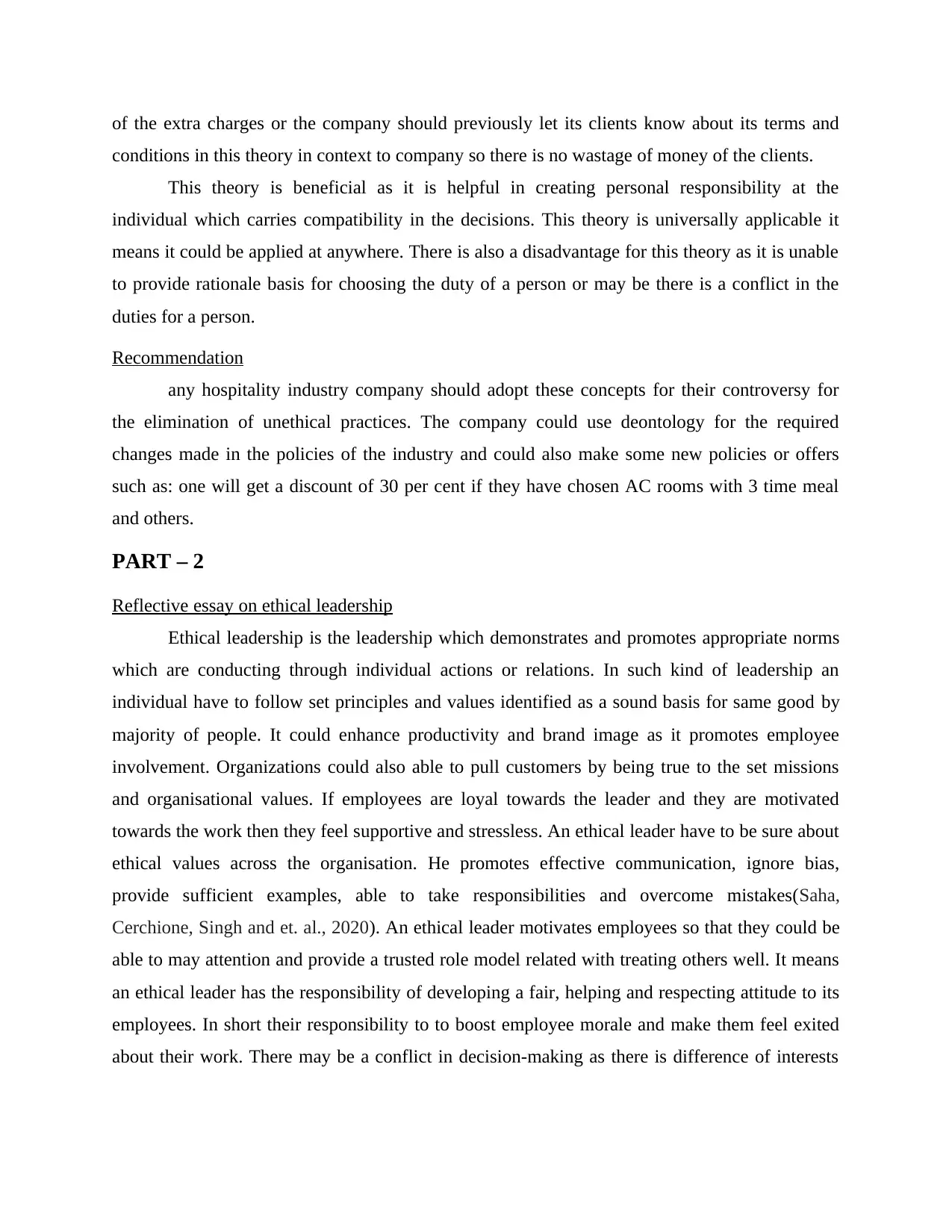
of the extra charges or the company should previously let its clients know about its terms and
conditions in this theory in context to company so there is no wastage of money of the clients.
This theory is beneficial as it is helpful in creating personal responsibility at the
individual which carries compatibility in the decisions. This theory is universally applicable it
means it could be applied at anywhere. There is also a disadvantage for this theory as it is unable
to provide rationale basis for choosing the duty of a person or may be there is a conflict in the
duties for a person.
Recommendation
any hospitality industry company should adopt these concepts for their controversy for
the elimination of unethical practices. The company could use deontology for the required
changes made in the policies of the industry and could also make some new policies or offers
such as: one will get a discount of 30 per cent if they have chosen AC rooms with 3 time meal
and others.
PART – 2
Reflective essay on ethical leadership
Ethical leadership is the leadership which demonstrates and promotes appropriate norms
which are conducting through individual actions or relations. In such kind of leadership an
individual have to follow set principles and values identified as a sound basis for same good by
majority of people. It could enhance productivity and brand image as it promotes employee
involvement. Organizations could also able to pull customers by being true to the set missions
and organisational values. If employees are loyal towards the leader and they are motivated
towards the work then they feel supportive and stressless. An ethical leader have to be sure about
ethical values across the organisation. He promotes effective communication, ignore bias,
provide sufficient examples, able to take responsibilities and overcome mistakes(Saha,
Cerchione, Singh and et. al., 2020). An ethical leader motivates employees so that they could be
able to may attention and provide a trusted role model related with treating others well. It means
an ethical leader has the responsibility of developing a fair, helping and respecting attitude to its
employees. In short their responsibility to to boost employee morale and make them feel exited
about their work. There may be a conflict in decision-making as there is difference of interests
conditions in this theory in context to company so there is no wastage of money of the clients.
This theory is beneficial as it is helpful in creating personal responsibility at the
individual which carries compatibility in the decisions. This theory is universally applicable it
means it could be applied at anywhere. There is also a disadvantage for this theory as it is unable
to provide rationale basis for choosing the duty of a person or may be there is a conflict in the
duties for a person.
Recommendation
any hospitality industry company should adopt these concepts for their controversy for
the elimination of unethical practices. The company could use deontology for the required
changes made in the policies of the industry and could also make some new policies or offers
such as: one will get a discount of 30 per cent if they have chosen AC rooms with 3 time meal
and others.
PART – 2
Reflective essay on ethical leadership
Ethical leadership is the leadership which demonstrates and promotes appropriate norms
which are conducting through individual actions or relations. In such kind of leadership an
individual have to follow set principles and values identified as a sound basis for same good by
majority of people. It could enhance productivity and brand image as it promotes employee
involvement. Organizations could also able to pull customers by being true to the set missions
and organisational values. If employees are loyal towards the leader and they are motivated
towards the work then they feel supportive and stressless. An ethical leader have to be sure about
ethical values across the organisation. He promotes effective communication, ignore bias,
provide sufficient examples, able to take responsibilities and overcome mistakes(Saha,
Cerchione, Singh and et. al., 2020). An ethical leader motivates employees so that they could be
able to may attention and provide a trusted role model related with treating others well. It means
an ethical leader has the responsibility of developing a fair, helping and respecting attitude to its
employees. In short their responsibility to to boost employee morale and make them feel exited
about their work. There may be a conflict in decision-making as there is difference of interests
⊘ This is a preview!⊘
Do you want full access?
Subscribe today to unlock all pages.

Trusted by 1+ million students worldwide
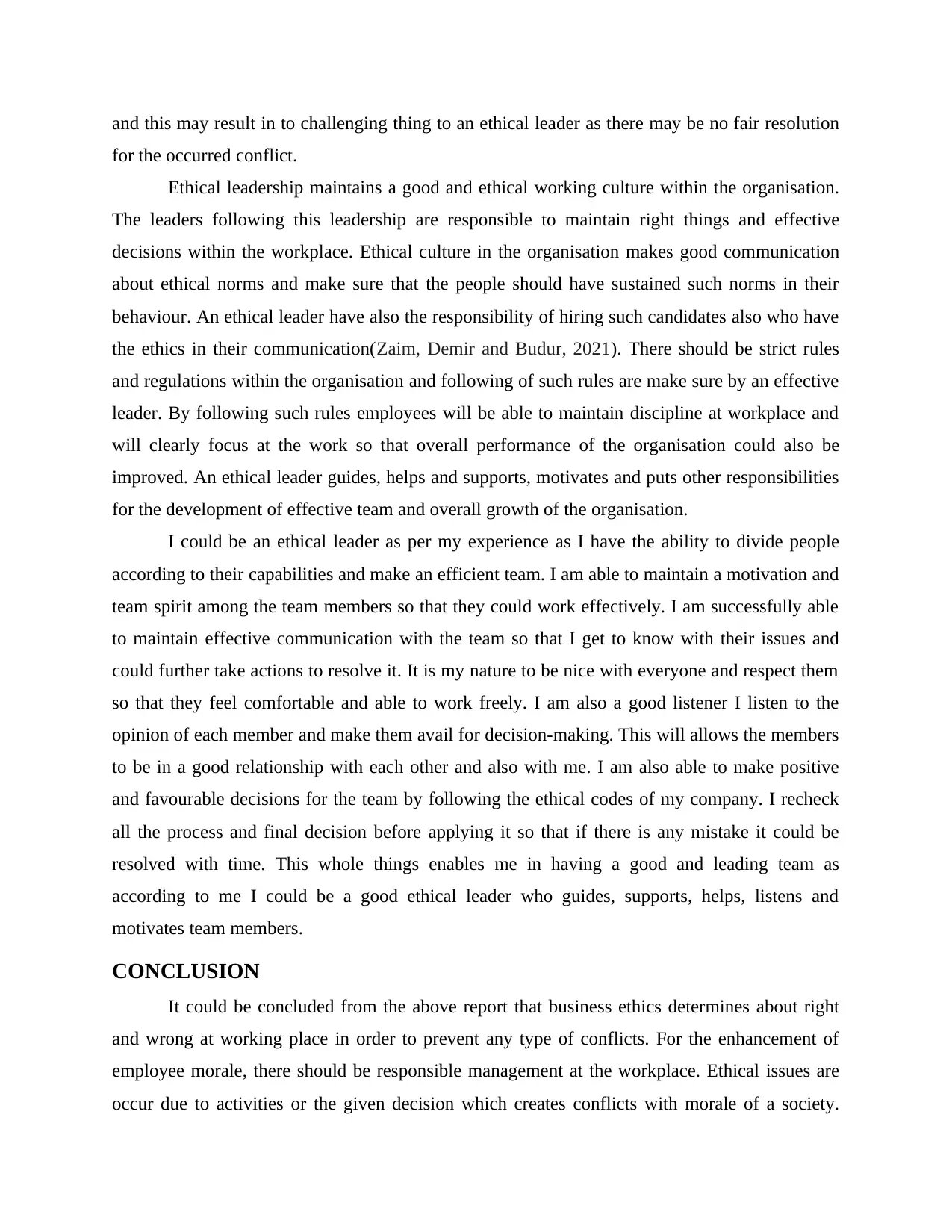
and this may result in to challenging thing to an ethical leader as there may be no fair resolution
for the occurred conflict.
Ethical leadership maintains a good and ethical working culture within the organisation.
The leaders following this leadership are responsible to maintain right things and effective
decisions within the workplace. Ethical culture in the organisation makes good communication
about ethical norms and make sure that the people should have sustained such norms in their
behaviour. An ethical leader have also the responsibility of hiring such candidates also who have
the ethics in their communication(Zaim, Demir and Budur, 2021). There should be strict rules
and regulations within the organisation and following of such rules are make sure by an effective
leader. By following such rules employees will be able to maintain discipline at workplace and
will clearly focus at the work so that overall performance of the organisation could also be
improved. An ethical leader guides, helps and supports, motivates and puts other responsibilities
for the development of effective team and overall growth of the organisation.
I could be an ethical leader as per my experience as I have the ability to divide people
according to their capabilities and make an efficient team. I am able to maintain a motivation and
team spirit among the team members so that they could work effectively. I am successfully able
to maintain effective communication with the team so that I get to know with their issues and
could further take actions to resolve it. It is my nature to be nice with everyone and respect them
so that they feel comfortable and able to work freely. I am also a good listener I listen to the
opinion of each member and make them avail for decision-making. This will allows the members
to be in a good relationship with each other and also with me. I am also able to make positive
and favourable decisions for the team by following the ethical codes of my company. I recheck
all the process and final decision before applying it so that if there is any mistake it could be
resolved with time. This whole things enables me in having a good and leading team as
according to me I could be a good ethical leader who guides, supports, helps, listens and
motivates team members.
CONCLUSION
It could be concluded from the above report that business ethics determines about right
and wrong at working place in order to prevent any type of conflicts. For the enhancement of
employee morale, there should be responsible management at the workplace. Ethical issues are
occur due to activities or the given decision which creates conflicts with morale of a society.
for the occurred conflict.
Ethical leadership maintains a good and ethical working culture within the organisation.
The leaders following this leadership are responsible to maintain right things and effective
decisions within the workplace. Ethical culture in the organisation makes good communication
about ethical norms and make sure that the people should have sustained such norms in their
behaviour. An ethical leader have also the responsibility of hiring such candidates also who have
the ethics in their communication(Zaim, Demir and Budur, 2021). There should be strict rules
and regulations within the organisation and following of such rules are make sure by an effective
leader. By following such rules employees will be able to maintain discipline at workplace and
will clearly focus at the work so that overall performance of the organisation could also be
improved. An ethical leader guides, helps and supports, motivates and puts other responsibilities
for the development of effective team and overall growth of the organisation.
I could be an ethical leader as per my experience as I have the ability to divide people
according to their capabilities and make an efficient team. I am able to maintain a motivation and
team spirit among the team members so that they could work effectively. I am successfully able
to maintain effective communication with the team so that I get to know with their issues and
could further take actions to resolve it. It is my nature to be nice with everyone and respect them
so that they feel comfortable and able to work freely. I am also a good listener I listen to the
opinion of each member and make them avail for decision-making. This will allows the members
to be in a good relationship with each other and also with me. I am also able to make positive
and favourable decisions for the team by following the ethical codes of my company. I recheck
all the process and final decision before applying it so that if there is any mistake it could be
resolved with time. This whole things enables me in having a good and leading team as
according to me I could be a good ethical leader who guides, supports, helps, listens and
motivates team members.
CONCLUSION
It could be concluded from the above report that business ethics determines about right
and wrong at working place in order to prevent any type of conflicts. For the enhancement of
employee morale, there should be responsible management at the workplace. Ethical issues are
occur due to activities or the given decision which creates conflicts with morale of a society.
Paraphrase This Document
Need a fresh take? Get an instant paraphrase of this document with our AI Paraphraser
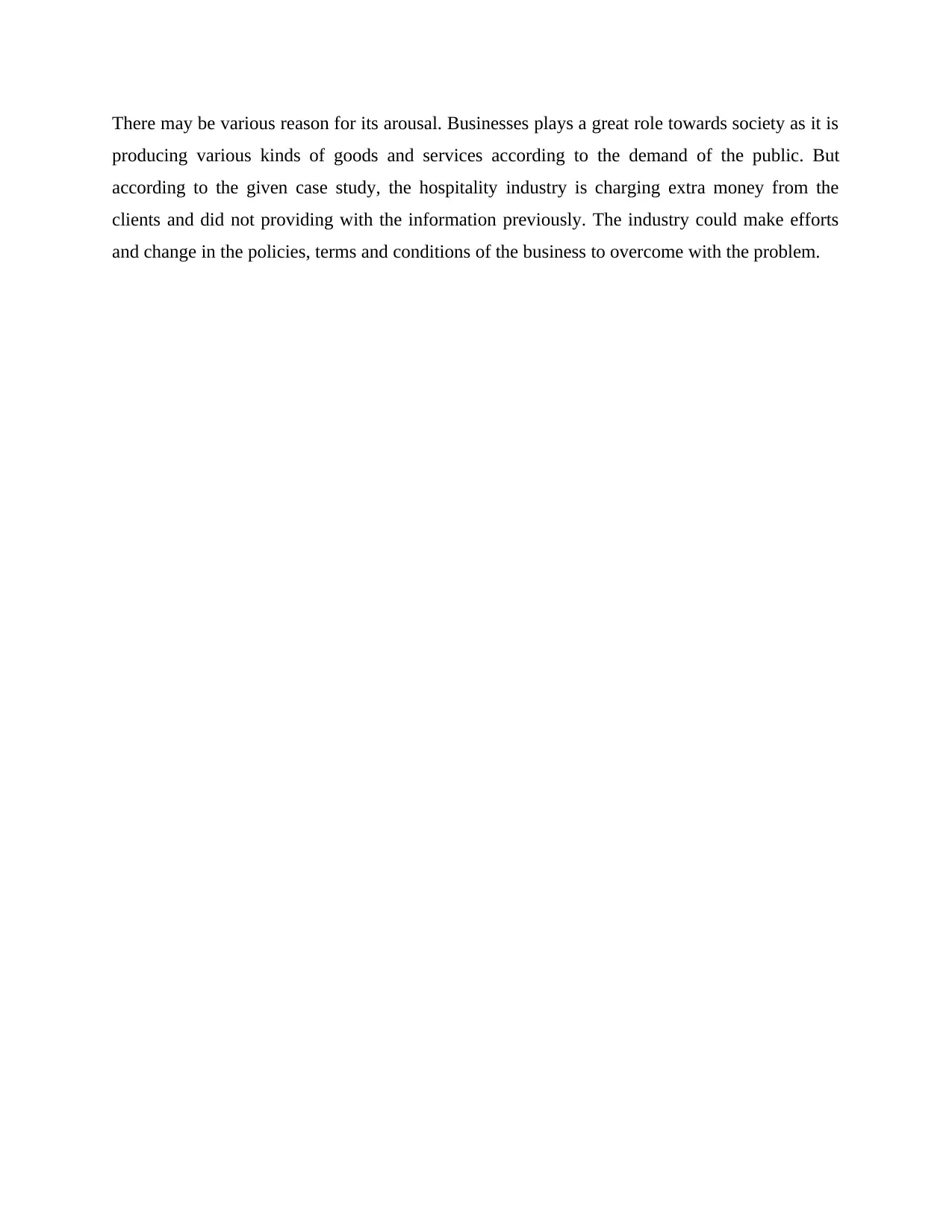
There may be various reason for its arousal. Businesses plays a great role towards society as it is
producing various kinds of goods and services according to the demand of the public. But
according to the given case study, the hospitality industry is charging extra money from the
clients and did not providing with the information previously. The industry could make efforts
and change in the policies, terms and conditions of the business to overcome with the problem.
producing various kinds of goods and services according to the demand of the public. But
according to the given case study, the hospitality industry is charging extra money from the
clients and did not providing with the information previously. The industry could make efforts
and change in the policies, terms and conditions of the business to overcome with the problem.
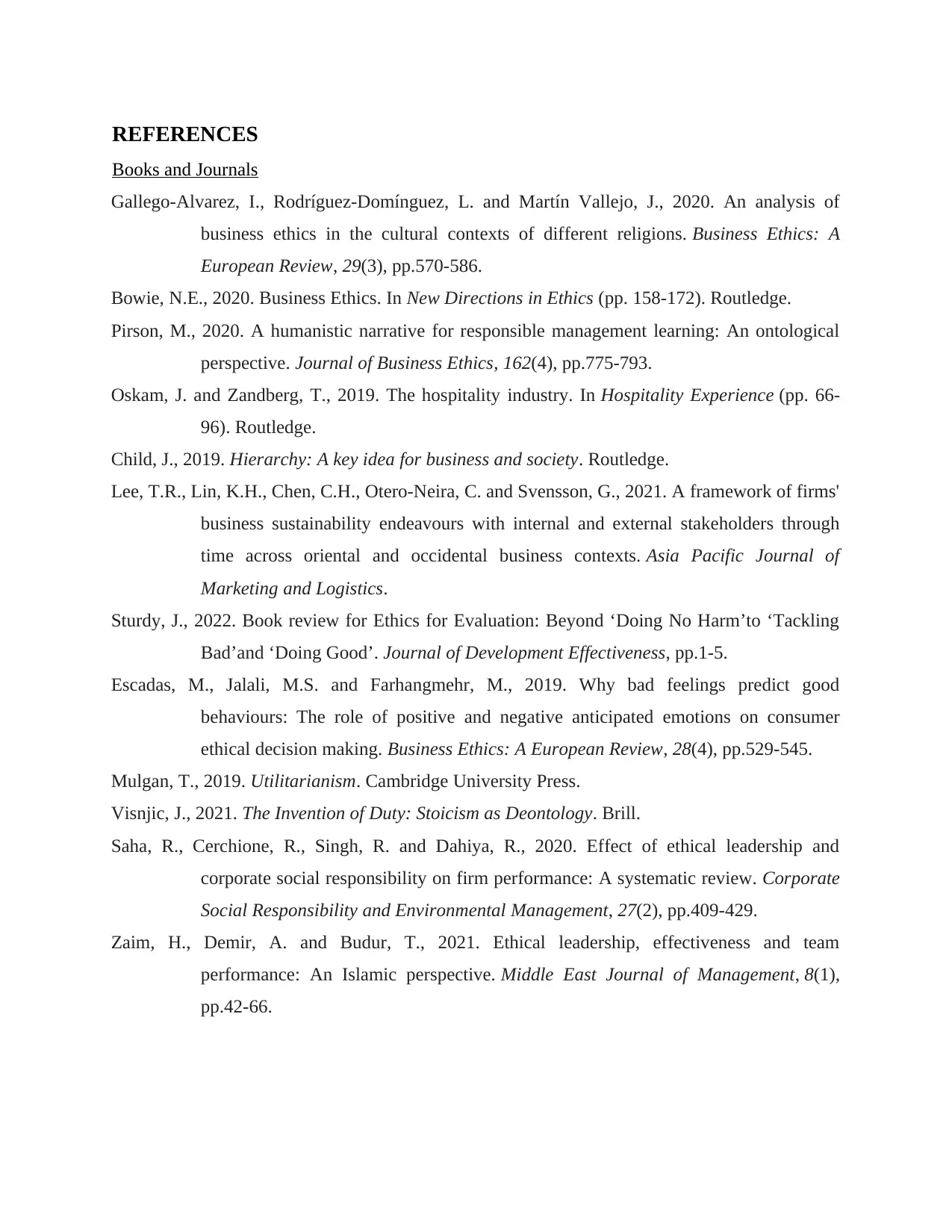
REFERENCES
Books and Journals
Gallego‐Alvarez, I., Rodríguez‐Domínguez, L. and Martín Vallejo, J., 2020. An analysis of
business ethics in the cultural contexts of different religions. Business Ethics: A
European Review, 29(3), pp.570-586.
Bowie, N.E., 2020. Business Ethics. In New Directions in Ethics (pp. 158-172). Routledge.
Pirson, M., 2020. A humanistic narrative for responsible management learning: An ontological
perspective. Journal of Business Ethics, 162(4), pp.775-793.
Oskam, J. and Zandberg, T., 2019. The hospitality industry. In Hospitality Experience (pp. 66-
96). Routledge.
Child, J., 2019. Hierarchy: A key idea for business and society. Routledge.
Lee, T.R., Lin, K.H., Chen, C.H., Otero-Neira, C. and Svensson, G., 2021. A framework of firms'
business sustainability endeavours with internal and external stakeholders through
time across oriental and occidental business contexts. Asia Pacific Journal of
Marketing and Logistics.
Sturdy, J., 2022. Book review for Ethics for Evaluation: Beyond ‘Doing No Harm’to ‘Tackling
Bad’and ‘Doing Good’. Journal of Development Effectiveness, pp.1-5.
Escadas, M., Jalali, M.S. and Farhangmehr, M., 2019. Why bad feelings predict good
behaviours: The role of positive and negative anticipated emotions on consumer
ethical decision making. Business Ethics: A European Review, 28(4), pp.529-545.
Mulgan, T., 2019. Utilitarianism. Cambridge University Press.
Visnjic, J., 2021. The Invention of Duty: Stoicism as Deontology. Brill.
Saha, R., Cerchione, R., Singh, R. and Dahiya, R., 2020. Effect of ethical leadership and
corporate social responsibility on firm performance: A systematic review. Corporate
Social Responsibility and Environmental Management, 27(2), pp.409-429.
Zaim, H., Demir, A. and Budur, T., 2021. Ethical leadership, effectiveness and team
performance: An Islamic perspective. Middle East Journal of Management, 8(1),
pp.42-66.
Books and Journals
Gallego‐Alvarez, I., Rodríguez‐Domínguez, L. and Martín Vallejo, J., 2020. An analysis of
business ethics in the cultural contexts of different religions. Business Ethics: A
European Review, 29(3), pp.570-586.
Bowie, N.E., 2020. Business Ethics. In New Directions in Ethics (pp. 158-172). Routledge.
Pirson, M., 2020. A humanistic narrative for responsible management learning: An ontological
perspective. Journal of Business Ethics, 162(4), pp.775-793.
Oskam, J. and Zandberg, T., 2019. The hospitality industry. In Hospitality Experience (pp. 66-
96). Routledge.
Child, J., 2019. Hierarchy: A key idea for business and society. Routledge.
Lee, T.R., Lin, K.H., Chen, C.H., Otero-Neira, C. and Svensson, G., 2021. A framework of firms'
business sustainability endeavours with internal and external stakeholders through
time across oriental and occidental business contexts. Asia Pacific Journal of
Marketing and Logistics.
Sturdy, J., 2022. Book review for Ethics for Evaluation: Beyond ‘Doing No Harm’to ‘Tackling
Bad’and ‘Doing Good’. Journal of Development Effectiveness, pp.1-5.
Escadas, M., Jalali, M.S. and Farhangmehr, M., 2019. Why bad feelings predict good
behaviours: The role of positive and negative anticipated emotions on consumer
ethical decision making. Business Ethics: A European Review, 28(4), pp.529-545.
Mulgan, T., 2019. Utilitarianism. Cambridge University Press.
Visnjic, J., 2021. The Invention of Duty: Stoicism as Deontology. Brill.
Saha, R., Cerchione, R., Singh, R. and Dahiya, R., 2020. Effect of ethical leadership and
corporate social responsibility on firm performance: A systematic review. Corporate
Social Responsibility and Environmental Management, 27(2), pp.409-429.
Zaim, H., Demir, A. and Budur, T., 2021. Ethical leadership, effectiveness and team
performance: An Islamic perspective. Middle East Journal of Management, 8(1),
pp.42-66.
⊘ This is a preview!⊘
Do you want full access?
Subscribe today to unlock all pages.

Trusted by 1+ million students worldwide
1 out of 12
Related Documents
Your All-in-One AI-Powered Toolkit for Academic Success.
+13062052269
info@desklib.com
Available 24*7 on WhatsApp / Email
![[object Object]](/_next/static/media/star-bottom.7253800d.svg)
Unlock your academic potential
Copyright © 2020–2026 A2Z Services. All Rights Reserved. Developed and managed by ZUCOL.





